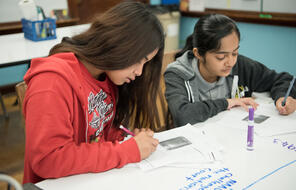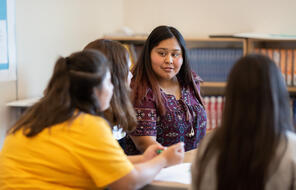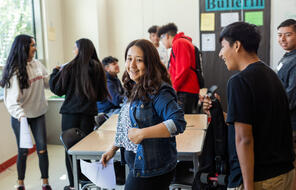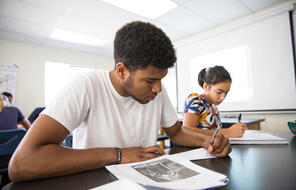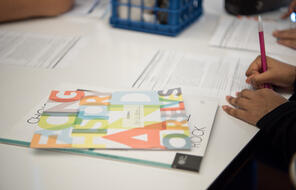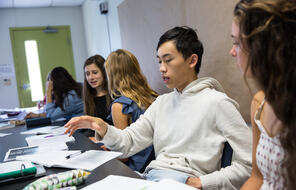My Dell Hid My Privilege and My Mac Hid My Financial Need
At a Glance
Language
English — USSubject
- English & Language Arts
- Culture & Identity
By Zöe Sottile
The most exciting part was the laptop.
My mom grabbed the thick envelope out of my hands and read off the amenities associated with the Tang Scholarship to Phillips Academy: full tuition for all four years, a free summer trip, $20 a week for me to spend on all the Cheetos and nail polish my heart desired, and finally, a free laptop.
I had never had a computer of my own before, and to me the prospect symbolized a world of new possibilities. I was the only student from my public middle school I knew to ever go to an elite boarding school, and it felt like being invited into a selective club. My first week at Andover, dazed by its glamour and newness, I fought my way to the financial aid office to pick up the laptop; I sent my mom a photo of me grinning and clutching the cardboard box. Back in my dorm room, I pulled out my prize, a heavy but functional Dell, and marveled at its sleek edges, its astonishing speed.
But the love story of my laptop came clamoring to a halt. In the library, as I stumbled to negotiate a space to fit in, I watched my friends each pull out a MacBook. Each was paper-thin and seemingly weightless. And mine, heavy enough to hurt my back and constantly sighing like a tired dog, was distinctly out of place. My laptop, which I had thought was my ticket to the elite world of Andover, actually gave me away as the outsider I was.
For a long time, this was the crux of my Andover experience: always an outsider. When I hung out with wealthier friends, I was disoriented by how different their lives were from mine. While they spent summers in Prague or Paris, I spent mine mining the constellation of thrift stores around New Haven. The gap between full-scholarship and full-pay felt insurmountable.
But I also felt like an outsider going to meetings for the full-scholarship affinity group. My parents attended college and grew up wealthier than I did, giving me cultural capital many of my full-scholarship friends never had access to. Moreover, I’m white and could afford occasional concert tickets or sparkly earrings. The laptop, carried by all full-scholarship students and coded with hidden meanings, pivoted my friends’ understandings of me. At home, I grew up middle class, then became the privileged prep school girl. But at Andover, suddenly, I was poor. Trying to reconcile these conflicting identities, I realized how complex and mutable class is. My class is connected to my parents’ income, but it’s also rooted in cultural knowledge and objects that are charged with greater meaning.
Which brings me back to the laptop: in the middle of my senior fall, my exhausted Dell broke and I couldn’t afford another. When I managed to borrow a slim Mac from my school, I felt the walls around me reorient. I hoped that now I wouldn’t have to think about the electric web of privilege and power every time I sent an email. Instead, I felt a new anxiety: I worried when I sat in the magnificent dining hall with my beautiful computer that I had lost an important part of my identity.
When I started at Andover, these constant dueling tensions felt like a trap: like I would never be comfortable anywhere. (The school sensed it too, and all full-financial aid students now receive MacBooks.) But maybe it’s the opposite of a trap. Maybe I’m culturally ambidextrous, as comfortable introducing a speaker on the stage of Andover’s century-old chapel as getting my nose pierced in a tattoo parlor in New Haven. My hyper-awareness of how my Dell hid my privilege and how my Mac hid my financial need pushed me to be aware of what complicated stories were hiding behind my classmates’ seemingly simple facades. I am a full-scholarship student who benefits from cultural, socioeconomic and racial privilege: my story isn’t easy, but it’s still mine. 1
- 1Zöe Sottile, “My Dell hid my privilege and my Mac hid my financial need,” in “4 Standout College Application Essays,” New York Times, May 12, 2017. © 2017 The New York Times Company. All rights reserved. Reproduced with permission.

